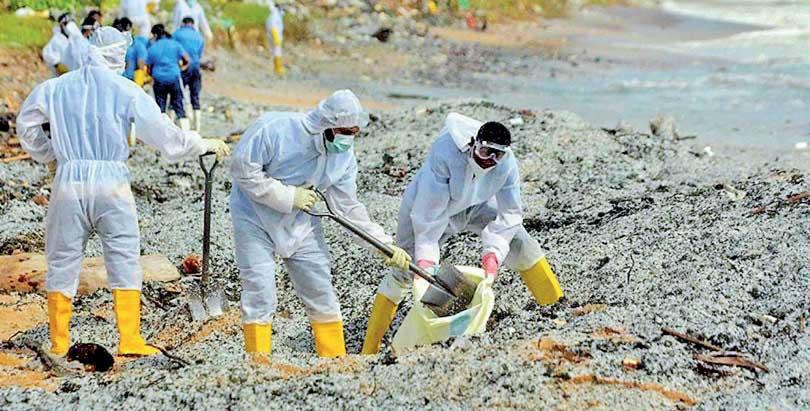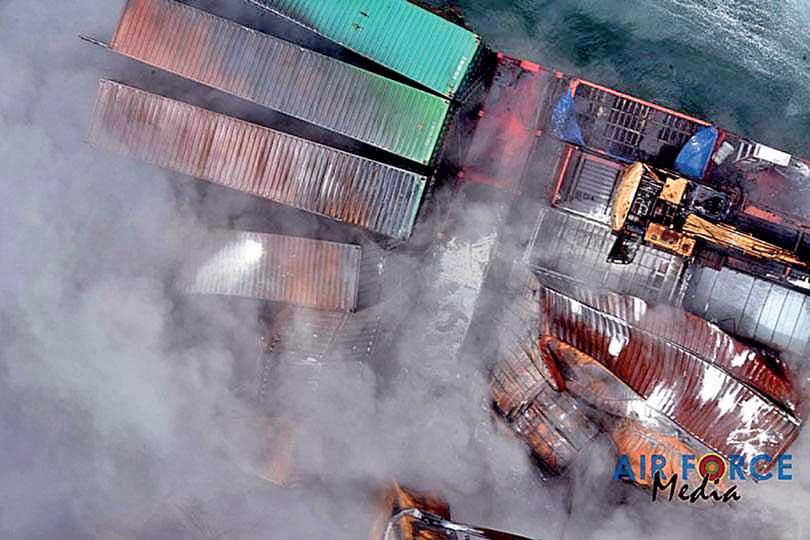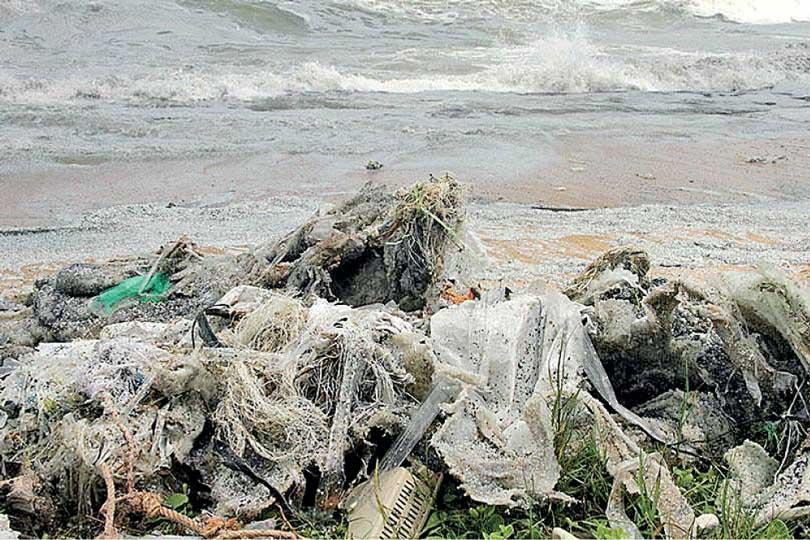Reply To:
Name - Reply Comment
Last Updated : 2024-04-27 21:03:00
 Triforces personnel clearing debris including micro plastics washed ashore
Triforces personnel clearing debris including micro plastics washed ashore
 Burnt debris from the controversial X-Press Pearl vessel has been carried away to shores as far as Galle, Kalpitiya and Chilaw. Even though the fire has largely been controlled the impact from the damage is huge. Tri forces personnel are continuing to clean the shores amidst uncertain conditions. Marine experts warn that marine animals could mistakenly feed on polypropylene granules also known as nurdles that have been deposited on the shores. As Sri Lanka is witnessing an irreversible maritime hazard in recent history, a country located along a frequently used maritime route, may need to prepare itself with better resources and technology to respond to similar or worse accidents in the future.
Burnt debris from the controversial X-Press Pearl vessel has been carried away to shores as far as Galle, Kalpitiya and Chilaw. Even though the fire has largely been controlled the impact from the damage is huge. Tri forces personnel are continuing to clean the shores amidst uncertain conditions. Marine experts warn that marine animals could mistakenly feed on polypropylene granules also known as nurdles that have been deposited on the shores. As Sri Lanka is witnessing an irreversible maritime hazard in recent history, a country located along a frequently used maritime route, may need to prepare itself with better resources and technology to respond to similar or worse accidents in the future.
SL hasn’t signed any international treaty to claim HNS damages : CEJ
The Centre for Environmental Justice (CEJ)is in the process of filing a public interest litigation against the company that owns X-Press Pearl. “This may involve certain government officials as well,” opined CEJ Chairman, Attorney-at-Law Ravindranath Dabare. “According to the Marine Pollution Prevention Act No. 35 of 2008, a civil suit can be filed under Section 35 and criminal action could be filed as per Section 26. We had a bitter experience with MT New Diamond as we claimed compensation based on the Polluter Pays Principle.” said Dabare.

In order to execute Section 34 there are certain limitations mentioned in Section 35, but none of the regulations have been laid out by the Minister
CEJ Chairman, Attorney-at-Law Ravindranath Dabare
Dabare further said that they have observed a lacuna in the Act while claiming that Sri Lanka hasn’t signed any international treaty to claim compensation for damages caused by spillage of Hazardous and Noxious Substances (HNS) during maritime transportation. “One of the main treaties is the International Convention on Liability and Compensation for Damage in Connection with the Carriage of Hazardous and Noxious Substances by Sea (HNS) created in 1996.
“However, even though Section 34 of the Act deals with how to file a civil liability case it doesn’t even mention in which courthouse such cases could be filed,” Dabare continued. “In order to execute Section 34 there are certain limitations mentioned in Section 35, but none of the regulations have been laid out by the Minister,” he said.
Recovery should be species-specific : Dr. Reddy
“Many oil spills happen everyday from cargo vessels and they carry millions of gallons of fuel,” opined Dr. Christopher M. Reddy, Senior Scientist at Woods Hole Oceanographic Institution, Massachusetts, USA with an expertise in marine pollution and petroleum geochemistry studies. Dr. Reddy has spent much time understanding ocean plastics while studying iconic oil spills such as the Deepwater Horizon Disaster (Gulf of Mexico, 2010) and nature’s response to such events over time. “However one needs to worry about location and type of fuel. Being close to the shore allows responders to have the land as a base. Logistics and infrastructure play a key role. If it is the deep sea it’s too difficult to respond and difficult to get trained people on the site. Planning what’s going to happen is a significant challenge,” said Reddy.

Corals, mangroves and large fish populations would be impacted. It takes a long time for ecosystems to develop. There are areas which will be slow to recover. But a good rule of thumb is to identify where the oil is going
Dr. Christopher M. Reddy, Senior Scientist at Woods Hole Oceanographic Institution, Massachusetts, USA
However, the MEPA earlier said that the water around the ship has taken a greasy appearance due to burnt plastics and not because of an oil spill. “A lot of different materials can create a sheen on the surface,” Dr. Reddy continued. I’m not surprised if there’s a sheen at the site of the incident. But this needs to be analysed.” he added.
Responding to a query on the duration of recovery Dr. Reddy said that one needs to study how the species impacted by the incident would recover and how the coastline is recovering. “Some species will reproduce and recover quickly while others will slow down in their recovery process. Corals, mangroves and large fish populations would be impacted. It takes a long time for ecosystems to develop. There are areas which will be slow to recover. But a good rule of thumb is to identify where the oil is going. Concentrate more on types of species that would take time to recover. It is difficult to predict recovery. Mother Nature is resilient.

Fire onboard the controversial vessel controlled
I have seen large oil spills where the impact is insignificant and vice versa. Recovery should be species-specific and a sound understanding of the baseline ecosystem before the oil spill will give an idea of how long it would take to recover,” he explained.
He further said that Sri Lanka should be clear in communicating how safe it’s waters are. “People who visit the country should be informed about how safe it is to visit the beach following this incident. Those who buy seafood also should be informed,” he added.
Dr. Reddy also said that those engaged in cleanups should be careful as there are a lot of unknowns about burnt debris. “Their ultimate goal is to prevent something bad from going to its worse. Without proper equipment and training they are taking a risk. One should keep track of where they are while making sure that they don’t get overexposed to any chemical leak or pollution,” he advised.

From the little I read, the response in Sri lanka was also excellent. However, the reality is that ocean conditions are posing problems. I think this argues for some investment in remotely operated vehicles, such as gliders, that are resilient in these ocean conditions
Prof. Lihini Aluwihare, chemical oceanographer at Scripps Institution of Oceanography, University of California, San Diego
Ocean conditions are posing problems :
Prof. Aluwihare
The Daily Mirror also spoke to Prof. Lihini Aluwihare, chemical oceanographer at Scripps Institution of Oceanography, University of California, San Diego whose research interests include studying the cycling of carbon and nitrogen in oceans. Stressing on the impacts of plastic materials washed ashore Prof. Aluwihare said that there are studies that show that plastics will enter all parts of the food web- from small, millimeter sized organisms, all the way up to charismatic megafauna.
The following are excerpts of an interview done with Prof. Aluwihare.
Q How do oil spills and chemical pollution affect oxygen concentration in marine environments?
Oil can be made of 100s of individual compounds and each of these compounds can have different fates in the environment. Some compounds are evaporated, some can aggregate and sink out, and still others can be degraded by microorganisms (bacteria, for example). If there is a lot of degradation -essentially this is respiration by microorganisms – then oxygen in the surrounding water can be drawn down and decreased. This will depend on the composition of the oil and how much spilled into the water. For other chemicals, again, composition – the identity of the chemicals – matters. Ammonia, nitrate and phosphate – fertilizer essentially- can fertilize the ocean, and once all the biomass grows it gets respired by microorganisms, which consumes oxygen in the water. Other chemicals may not influence oxygen at all. The bottom line is that oxygen will only be impacted if the biology responds to the spilled chemicals.

Once pristine beaches turned ugly with burnt debris
QA large amount of micro plastics have accumulated on seashores as a result of the burning ship. What would be the short-term and long-term impacts of these materials on marine life?
This is difficult to predict as you know plastics are persistent. If the pieces are large enough, I hope there will be some clean up. There are studies that show that plastics will enter all parts of the food web- from small, millimeter sized organisms, all the way up to charismatic megafauna. The hazardous impact of micro and nano plastics on tiny marine organisms is a focus of many current studies. However, I think we are all aware of how larger pieces can adversely impact larger marine life. So, entering the food web could be part of its fate. Interaction with sunlight will also contribute to making the pieces smaller and altering their composition to some extent.
QFrom your experience what are the immediate steps that need to be taken in a situation like this? A clean up is underway but is there anything more than that?
Making sure all the relevant parties – from scientists to government officials to conservation groups etc – are involved and communicating openly in an organised response is very important. Making sure the public is getting high quality and accurate information is important. Having an accurate accounting of what was on the ship, what the immediate fate of some of the chemicals might have been, the type of fuel oil it was carrying etc, is the first necessary step. It is also important to document what the coastline looks like before, during and after – photographs are easy. Taking water samples as soon as possible, including any spilled oil, is also crucial, and that has to continue for some time. This is much more difficult at the moment. I know that right now the water is very rough and getting out to get samples is difficult. Having access to remote observation tools – gliders: “planes” that “fly” through the water remotely, measuring different properties of the water, sending messages via satellite, back to land would be fantastic, but access to that might be limited. Using satellites to measure how ocean color has changed – both because of the response of marine organisms, but also as a result of chemicals in the water – would normally be possible, but the cloud cover is posing some concerns. So this is a challenge because most of the easy access routes to monitor how the ocean is being immediately altered are not available and this is also concerning because documenting environmental impacts is crucial for securing any support for future clean up efforts. Taking samples for studying biota will also be important, but again, access is a problem. In the long run, potentially using existing models of local coastal circulation to predict how chemicals might ‘travel’ will be helpful and this demonstrates why it is important to know what was on the ship because it is necessary to know how the chemicals might behave in seawater. Analyzing different components in the sediments may be the best in the long-run – by sediments I am referring to the seabed underneath the spill – because they have a way of ‘remembering’ what happened in the water above.
Q As a frequently used maritime route, how should Sri Lanka prepare to face similar disasters in the future? (In terms of technology, early warnings, logistics, specialized crews etc.)
I think this is a fantastic question and one that folks with much more power and money than me should be thinking deeply about. There are probably models out there in the world – especially in more affluent countries – that are worth looking into. For example, off the coast of California where I am, there is lots of trade and military traffic in the ocean and they probably have some rapid response technologies that are relevant. From the little I read, the response in Sri lanka was also excellent. However, the reality is that ocean conditions are posing problems. I think this argues for some investment in remotely operated vehicles, such as gliders, that are resilient in these ocean conditions. Both vehicles that can take measurement of ocean conditions (chlorophyll concentrations and oxygen concentrations – both biological responses) and also bring samples back to shore will be very useful. Getting samples early is crucial – this determines what the response should and it also allows scientists to share accurate information with the public. Obviously, knowing where sensitive ecosystems are (both stationary and migratory etc) is important because these areas should be avoided I would say almost at any cost. Also, having a regular monitoring program in these areas where ships are travelling so that scientists in Sri Lanka have a good idea of the baseline conditions is super important because if you don’t know what a system looked like before disaster struck you might miss some very important signals of impacts.
Shipowners, route unknown : Dr. Wijegunawardena
One of the major concerns about X-Press Pearl is about its ownership and route. Even though it has been registered in Singapore and claimed that it has contacted ports in Qatar and India, several questions remain unanswered. In a shocking revelation, Dr. Chandima Wijegunawardena of the Princess Nourah University, Riyadh claimed that the INTERPOL was aware of two chemical ships in the Indian Ocean. “If the INTERPOL could alert Pakistan about one of the Mercury-containing vessels which is now at Gadani Port, Pakistan, why were Sri Lankan authorities not informed about it,” Dr.Wijegunawardena questioned at a recently held press conference.
Speaking to the Daily Mirror Dr. Wijegunawardena recalled the explosion that took place in Beirut killing 270 people. “That ship carried ammonium nitrate and it has no registration or owner. Following the incident the Lebanese economy collapsed. Sri Lanka on the other hand depends on fish exports, agriculture and tourism. If X-Press Pearl contained explosive chemicals it could have exploded. If our authorities don’t care about our waters it shows that this country isn’t safe,” she opined.
“The ship carried the Singapore flag and claims that it contacted Qatar and Indian ports, but we are in the middle of Qatar and Singapore,” she continued. “It’s highly likely that this ship came from somewhere outside the Indian Ocean. So we need to know from where these chemicals were carried and the people behind this, ” Dr. Wijegunawardena added.
If the INTERPOL could alert Pakistan about one of the Mercury-containing vessels which is now at Gadani Port, Pakistan, why were Sri Lankan authorities not informed about it conditions
Dr. Chandima Wijegunawardena of the Princess Nourah University, Riyadh
Operation 30-days
at Sea 3.0
Thousands of suspects, companies and criminal networks engaged in maritime pollution have been detected and investigated in a global INTERPOL-led operation. ‘Operation 30 days at Sea 3.0’ which took place from March 1-31, 2021 witnessed the participation of 300 agencies across 67 countries conducting 34,000 inspections at sea and inland waterways, coastal areas and ports to detect maritime pollution violations.
Frontline action followed five months of intelligence collection and analysis, enabling the identification of specific hotspots and suspects behind the criminal, deliberate pollution of world’s waterways.
Preliminary results from the operation’s tactical phase included the detection of 1,600 maritime pollution offenses, often triggering fines and follow-up investigations across all continents. These include :
■Nearly 500 illegal acts of pollution committed at sea including oil discharges, illegal ship breaking and sulphur emissions from vessels;
■1000 pollution offenses in coastal areas and rivers including illegal discharges of sewage, mercury, plastics and other contaminants leading to serious water contamination which flows into the oceans;
■130 cases of waste trafficking through ports.
A major criminal network trafficking plastic waste from Europe to Asia was exposed, triggering cooperation from authorities in both regions. So far, 22 suspects have been arrested and thousands of tonnes of waste have been prevented from being illegally shipped to Asia, where it would have likely been dumped, contaminating soils and generating considerable marine litter.
sacre blieu Tuesday, 01 June 2021 09:33 AM
Observing that the threads of the once strong and well woven social fabric was, and with the passing of the years and the putrefaction of our politics, it would likely become worse. Not one one of those high profile cases, as had been promised by all governments, have been successively brought home to justice. Those at the bottom layer who have been waiting for justice indefinitely, are likely experiencing humiliation been subject to various kinds of deals, cursing the whole corrupt
Jeeves Wednesday, 02 June 2021 11:34 AM
Very interesting and informative article; many thanks. Our shortcomings have been exposed. Present incident has emphasised urgent need for robust legal framework, and policies to safeguard our territorial waters, environment and our health.
Ranjit wijesinha Thursday, 03 June 2021 04:03 PM
I live in Australia. And was watching Algzeera news. It was said that the SL government invited this ship to come to the SL waters. Shocking. I wonder whether that is true.

Add comment
Comments will be edited (grammar, spelling and slang) and authorized at the discretion of Daily Mirror online. The website also has the right not to publish selected comments.
Reply To:
Name - Reply Comment
US authorities are currently reviewing the manifest of every cargo aboard MV
On March 26, a couple arriving from Thailand was arrested with 88 live animal
According to villagers from Naula-Moragolla out of 105 families 80 can afford
Is the situation in Sri Lanka so grim that locals harbour hope that they coul

26 Apr 2024
26 Apr 2024